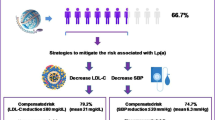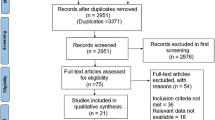Abstract
Data concerning the treatment of lipoprotein disturbances in patients with cerebrovascular disease (CVD) are less robust than those for coronary heart disease (CHD), raising clinical questions as to which is the appropriate therapeutic approach to stroke patients. Although observational cohort studies have failed to demonstrate an association between lipoprotein disorders and stroke incidence, recently completed trials of subjects at risk for CHD have shown that statins reduce not only the risk of myocardial infarction and death, but also that of brain infarction and transient ischemic attacks. At present, it seems reasonable to conclude that stroke patients with undesirable lipid profiles who have a history of CHD should receive specific treatment for the lipid disorder. Recommendations are more problematic for stroke patients with lipid disorder but no history of CHD. Furthermore, many of the risk factors for CVD and vascular dementia (VaD), including serum total cholesterol (TC), lipoprotein(a), diabetes, atrial fibrillation, hypertension, apolipoprotein E levels, and atherosclerosis, have also been shown to increase the risk of Alzheimer’s disease (AD). In a recent study, we estimated the prevalence, incidence and rate of progression of Mild Cognitive Impairment (MCI) to dementia, and correlated vascular risk factors with incident MCI and its progression to dementia. We evaluated 2963 individuals from the population-based sample of 5632 subjects 65–84 years old of the Italian Longitudinal Study on Aging, with a 3.5-year follow-up. We found a progression rate to dementia (all causes) of 3.8/100 person-years. Furthermore, age was a risk factor for incident MCI, while education was protective, and serum TC evidenced a non-significant borderline trend for a protective effect. There was a non-significant trend for stroke as a risk factor of progression of MCI to dementia. In conclusion, in our population, among MCI patients who progressed to dementia, 60% progressed to AD and 33% to VaD. Vascular risk factors and CVD may influence the development of MCI and the rate of progression to dementia.
Similar content being viewed by others
References
Amarenco P, Lavallee P, Touboul PJ. Stroke prevention, blood cholesterol, and statins. Lancet Neurol 2004; 3: 271–8.
Panza F, D’Introno A, Colacicco AM, et al. The role of vascular risk, beta-amyloid metabolism, and neuroinflammation in the genetics of late-onset Alzheimer’s disease. In Welsh EM, ed. Focus on Alzheimer’s Disease Research. New York: Nova Science Publishers, Inc, 2003: 208–37.
Panza F, D’Introno A, Colacicco AM, et al. Vascular risk and genetics of sporadic late-onset Alzheimer’s disease. J Neural Transm 2004; 111: 69–89.
Prospective studies collaboration. Cholesterol, diastolic blood pressure, and stroke: 13,000 strokes in 450,000 people in 45 prospective cohorts. Lancet 1995; 346: 1647–53.
Hebert PR, Gaziano JM, Hennekens CH. An overview of trials of cholesterol lowering and risk of stroke. Arch Intern Med 1995; 155: 50–5.
Heart Protection Collaborative Study Group. MRC/BHF heart protection study of cholesterol lowering with simvastatin in 20,536 high-risk individuals: A randomised placebo-controlled trial. Lancet 2002; 360: 7–22.
Shepherd J, Blauw GJ, Murphy MB, et al. Pravastatin in elderly individuals at risk of vascular disease (PROSPER): A randomised controlled trial. Lancet 2002; 360: 1623–30.
Sever PS, Dahlof B, Poulter NR, et al. Prevention of coronary and stroke events with atorvastatin in hypertensive patients who have average or lower-than-average cholesterol concentrations, in the Anglo-Scandinavian Cardiac Outcomes Trial —Lipid Lowering Arm (ASCOT-LLA): A multicentre randomised controlled trial. Lancet 2003; 361: 1149–58.
The SPARCL Investigators. Design and baseline characteristics of the Stroke Prevention by Aggressive Reduction in Cholesterol Levels (SPARCL) Study. Cerebrovasc Dis 2003; 16: 389–95.
Jarvik GP, Wijsman EM, Kukull WA, Schellenberg GD, Yu C, Larson EB. Interactions of apolipoprotein E genotype; total cholesterol level; age; and sex in prediction of Alzheimer’s disease: a case-control study. Neurology 1995; 45: 1092–6.
Notkola IL, Sulkava R, Pekkanen J, et al. Serum total cholesterol, apolipoprotein E epsilon 4 allele, and Alzheimer’s disease Neuroepidemiology 1998; 17: 14–20.
Kivipelto M, Helkala EL, Laakso MP, et al. Midlife vascular risk factors and Alzheimer’s disease in later life: longitudinal population based study. BMJ 2001; 322: 1447–51.
Kivipelto M, Helkala EL, Laakso MP, et al. Apolipoprotein E epsilon4 allele; elevated midlife total cholesterol level; and high midlife systolic blood pressure are independent risk factor for late-life Alzheimer disease. Ann Intern Med 2002; 137: 149–55.
Kuusisto J, Koivisto K, Mykkanen L, et al. Association between features of the insulin resistance syndrome and Alzheimer’s disease independently of apolipoprotein E4 phenotype: cross sectional population based study. BMJ 1997; 315: 1045–9.
Solfrizzi V, Panza F, D’Introno A, et al. Lipoprotein(a), apolipoprotein E genotype, and risk of Alzheimer’s disease. J Neurol Neurosurg Psychiatry 2002; 72: 732–6.
Fujishima M, Kiyohara Y. Incidence and risk factors of dementia in a defined elderly Japanese population: the Hisayama study. Ann NY Acad Sci 2002; 977: 1–8.
Boston P, Dennis MS, Jagger C. Factors associated with vascular dementia in an elderly community population. Int J Psychiatry 1999; 14: 761–6.
Crisby M, Carlson LA, Winblad B. Statins in the prevention and treatment of Alzheimer disease. Alzheimer Dis Assoc Dis 2002; 16: 131–6.
Wolozin B, Kellman W, Ruosseau P, Celesia GG, Siegel G. Decreased prevalence of Alzheimer disease associated with 3-hydroxy-3-methyglutaryl coenzyme A reductase inhibitors. Arch Neurol 2000; 57: 1439–43.
Rockwood K, Kirkland S, Hogan DB, et al. Use of lipid-lowering agents; indication bias; and the risk of dementia in community-dwelling elderly people. Arch Neurol 2002; 59: 223–7.
Li G, Higdon R, Kukull WA, et al. Statin therapy and risk of dementia in the elderly: a community-based prospective cohort study. Neurology 2004; 63: 1624–8.
Mooser V, Helbecque N, Miklossy J, Marcovina SM, Nicod P, Amouyel P. Interactions between apolipoprotein E and apolipoprotein(a) in patients with late-onset Alzheimer disease. Ann Intern Med 2000; 132: 533–7.
Emanuele E, Peros E, Tomaino C, et al. Relation of Apolipoprotein(a) Size to Alzheimer’s Disease and Vascular Dementia. Dement Geriatr Cogn Disord 2004; 18: 189–96.
D’Introno A, Panza F, Colacicco AM, Capurso A, Solfrizzi V. Mild Cognitive Impairment and related entities: role of vascular risk factors. In Panza F, Solfrizzi V, Capurso A, eds. Diet and cognitive decline. New York: Nova Science Publishers, Inc, 2004: 1–33.
Panza F, D’Introno A, Colacicco AM, et al. Cognitive frailty: Predementia syndrome and vascular risk factors. Neurobiol Aging 2005; [Epub ahead of print] doi:10.1016/j.neurobiolaging.2005.05.0082.
Panza F, D’Introno A, Colacicco AM, et al. Current epidemiology of mild cognitive impairment and other predementia syndromes. Am J Geriatr Psychiatry 2005; 13: 633–44.
Solfrizzi V, Panza F, Colacicco AM, et al. for the Italian Longitudinal Study on Aging Working Group. Vascular risk factors, incidence of MCI, and rates of progression to dementia. Neurology 2004; 63: 1882–91.
Henon H, Durieu I, Guerouaou D, Lebert F, Pasquier F, Leys D. Poststroke dementia: incidence and relationship to prestroke cognitive decline. Neurology 2001; 57: 1216–22.
Vermeer SE, Prins ND, den Heijer T, et al. Silent brain infarcts and the risk of dementia and cognitive decline. N Engl J Med 2003; 348: 1215–22.
Author information
Authors and Affiliations
Corresponding author
Additional information
This work was presented at the “International Meeting — The Aging People”, Pavia, 2–4 September 2004.
Rights and permissions
About this article
Cite this article
Panza, F., Solfrizzi, V., Colacicco, A.M. et al. Cerebrovascular disease in the elderly: lipoprotein metabolism and cognitive decline. Aging Clin Exp Res 18, 144–148 (2006). https://doi.org/10.1007/BF03327430
Received:
Accepted:
Published:
Issue Date:
DOI: https://doi.org/10.1007/BF03327430




